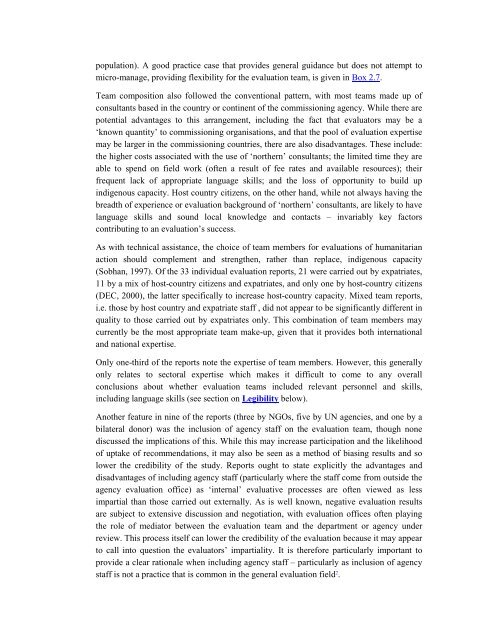Download PDF - ReliefWeb
Download PDF - ReliefWeb
Download PDF - ReliefWeb
You also want an ePaper? Increase the reach of your titles
YUMPU automatically turns print PDFs into web optimized ePapers that Google loves.
population). A good practice case that provides general guidance but does not attempt to<br />
micro-manage, providing flexibility for the evaluation team, is given in Box 2.7.<br />
Team composition also followed the conventional pattern, with most teams made up of<br />
consultants based in the country or continent of the commissioning agency. While there are<br />
potential advantages to this arrangement, including the fact that evaluators may be a<br />
‘known quantity’ to commissioning organisations, and that the pool of evaluation expertise<br />
may be larger in the commissioning countries, there are also disadvantages. These include:<br />
the higher costs associated with the use of ‘northern’ consultants; the limited time they are<br />
able to spend on field work (often a result of fee rates and available resources); their<br />
frequent lack of appropriate language skills; and the loss of opportunity to build up<br />
indigenous capacity. Host country citizens, on the other hand, while not always having the<br />
breadth of experience or evaluation background of ‘northern’ consultants, are likely to have<br />
language skills and sound local knowledge and contacts – invariably key factors<br />
contributing to an evaluation’s success.<br />
As with technical assistance, the choice of team members for evaluations of humanitarian<br />
action should complement and strengthen, rather than replace, indigenous capacity<br />
(Sobhan, 1997). Of the 33 individual evaluation reports, 21 were carried out by expatriates,<br />
11 by a mix of host-country citizens and expatriates, and only one by host-country citizens<br />
(DEC, 2000), the latter specifically to increase host-country capacity. Mixed team reports,<br />
i.e. those by host country and expatriate staff , did not appear to be significantly different in<br />
quality to those carried out by expatriates only. This combination of team members may<br />
currently be the most appropriate team make-up, given that it provides both international<br />
and national expertise.<br />
Only one-third of the reports note the expertise of team members. However, this generally<br />
only relates to sectoral expertise which makes it difficult to come to any overall<br />
conclusions about whether evaluation teams included relevant personnel and skills,<br />
including language skills (see section on Legibility below).<br />
Another feature in nine of the reports (three by NGOs, five by UN agencies, and one by a<br />
bilateral donor) was the inclusion of agency staff on the evaluation team, though none<br />
discussed the implications of this. While this may increase participation and the likelihood<br />
of uptake of recommendations, it may also be seen as a method of biasing results and so<br />
lower the credibility of the study. Reports ought to state explicitly the advantages and<br />
disadvantages of including agency staff (particularly where the staff come from outside the<br />
agency evaluation office) as ‘internal’ evaluative processes are often viewed as less<br />
impartial than those carried out externally. As is well known, negative evaluation results<br />
are subject to extensive discussion and negotiation, with evaluation offices often playing<br />
the role of mediator between the evaluation team and the department or agency under<br />
review. This process itself can lower the credibility of the evaluation because it may appear<br />
to call into question the evaluators’ impartiality. It is therefore particularly important to<br />
provide a clear rationale when including agency staff – particularly as inclusion of agency<br />
staff is not a practice that is common in the general evaluation field 7 .
















![CynefinFramework final [Read-Only]](https://img.yumpu.com/19017304/1/190x135/cynefinframework-final-read-only.jpg?quality=85)